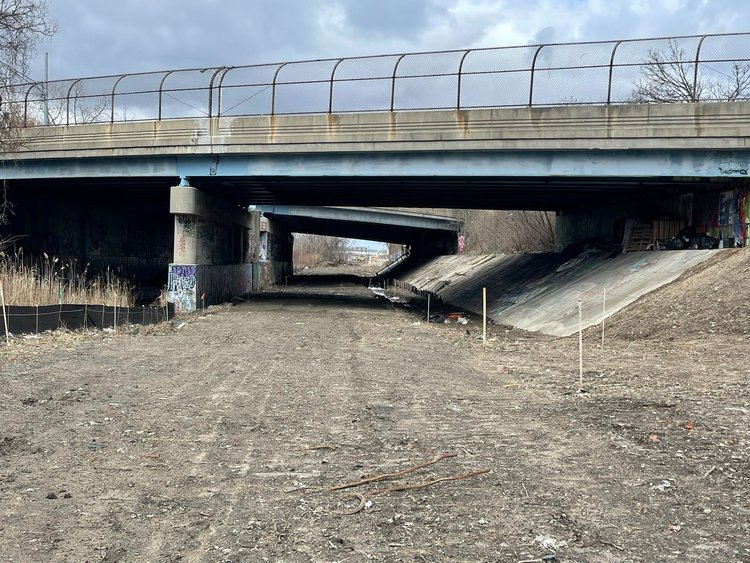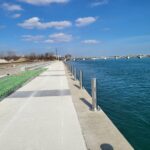
- Kim Kisner
- Community
- 09/22/2022
The Coalition Builds a Network of Greenways, Complete Streets, and Bike Lanes that Will Connect People and Places

The Detroit Greenways Coalition (DGC) works to promote and build a network of greenways, Complete Streets, and bike lanes that will connect people and places, improve the quality of life, beautify neighborhoods, and stimulate neighborhood-level economic development in Detroit.
Its mission is to create, conserve and promote greenways and green spaces to connect people, places, and nature. Its vision is a strong, healthy, vibrant City of Detroit and a region where a seamless network of greenways, green spaces, blueways, and Complete Streets are an integral part of people’s active lifestyles including day-to-day transportation and recreation.
SBN Detroit spoke to DGC Executive Director Todd Scott to gain insights about their work.
Q: How big of a driver was sustainability for the city of Detroit in the forming of the Greenways Coalition?
A: In the beginning, we had to tackle more basic issues about how to build and maintain greenways across the entire city and how to make green transportation easier and safer.
Our vision was certainly supporting sustainable transportation and green space, but we were focused initially on more basic issues. Some examples here are developing a citywide greenway network vision, advocating for redesigned city streets that better accommodate green transportation, and finding the resources to make this all a reality.
Over time we’ve been able to move beyond these issues and push sustainability more, especially in light of the need for Climate Action – reducing transportation carbon emissions and providing green stormwater management.
Q: The vision of the Greenways Coalition is ultimately to connect every neighborhood over time. Please speak to how this impacts the city in terms of sustainability from these aspects:
Environmental:
Greenways and Complete Streets (i.e. streets designed to safely accommodate all users) can do more than provide green transportation. They can help manage stormwater through green stormwater infrastructure, street trees, and even de-paving roads. They can also reduce urban heat island effects. Flooding and extreme heat are big issues in Detroit that our work can help address.
Transportation/Mobility:
The most important impact is how these connections help Detroiters use green transportation. That’s not just walking and biking, but public transit as well. They provide safe and convenient routes that connect schools, jobs, parks, retail areas, and more.
Economic:
There are many examples of greenways and Complete Streets driving economic urban revitalization around the world. Locally, there may be no better example than the Livernois Avenue of Fashion. The streetscape project reduced vehicle travel lanes (and speeding), widened sidewalks, and added bike lanes. Businesses along the route have flourished. There is a tremendous opportunity for additional retail revitalization along the 27-mile Joe Louis Greenway. It will be interesting to see how places like the Oakman/Grand River strip and even Downtown Hamtramck increase business activity as a result of the greenway and the bike and pedestrian traffic that it brings.
Social/Inclusivity:
Biking and walking can be very social. We’ve seen this with the numerous biking and walking clubs that have formed across the city over recent years, but especially during COVID. Greenways and Complete Streets support these club events that are open to everyone.

Q: Does the Greenways Coalition have a set of sustainability goals?
A: What we largely do is advocate for institutions to have sustainability goals. We’ve done that with the City of Detroit through their Sustainability Action Agenda. We’ve been heavily involved in the carbon neutrality discussion at the state level through the MI Healthy Climate Plan.
We’ve even weighed in on federal issues, such as the recently proposed U.S. DOT Greenhouse Gas Emissions rule. You could say our agenda is to get sustainability incorporated at the institutional level so that it leverages the benefits of our vision.
Q: From a sustainability standpoint what are the direct benefits the Greenways offer to Detroit residents?
A: The largest direct sustainability benefit is transportation. Greenways provide “green ways” to get to destinations around the city and to connect with public transportation. The “green” in greenways has multiple meanings. It’s more than just landscaping, it’s about sustainable transportation.
It’s also about saving some “green,” e.g. money. Sustainability can benefit Detroiters, but that benefit must also improve the financial sustainability of the household budget. Vehicle transportation can eat up a large portion of that budget. Greenways can benefit many and reduce that burden.
Be sure to subscribe to our newsletter for regular updates on sustainable business practices in and around Detroit.
Kim Kisner
- All
- Business
- Community
- Education
- Events

Unique Monique Scented Candles, a Detroit-based business founded by Monique Bounds., aims to produce candles and household products with clean ingredients and local supply chains. What began as a personal hobby during college has evolved into a full-time venture producing coconut oil and soy-based candles made with essential oils and locally sourced materials. SBN Detroit interviewed Bounds about launching a sustainable product line, sourcing challenges in Michigan, and...

Eastern Market Partnership, in collaboration with the City of Detroit’s Office of Sustainability Urban Agriculture Division, has announced $240,000 in grant funding to support Detroit-based farmers and farmer collectives. The grants will advance food access, climate education, sustainable land use, and economic opportunity, with priority given to Black- and Indigenous-led farms, youth-led initiatives, and projects rooted in historically disinvested neighborhoods. The recipients – ranging from cooperatives and community...

Citizen Robotics is a Detroit-based nonprofit that advances the use of robotics and digital manufacturing in residential construction, focusing on improving productivity, sustainability, and long-term affordability. Best known for its early work in 3D-printed housing, it explores how alternative construction methods and new financial models can reduce material waste, lower lifetime operating costs, and enhance the resilience of homes. SBN Detroit interviewed Tom Woodman, founder and president of...







